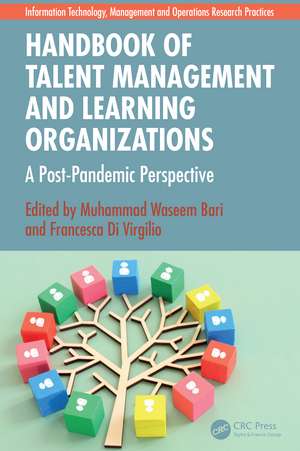Handbook of Talent Management and Learning Organizations: A Post-Pandemic Perspective: Information Technology, Management and Operations Research Practices
Editat de Muhammad Waseem Bari, Francesca Di Virgilioen Limba Engleză Hardback – 19 feb 2025
Handbook of Talent Management and Learning Organizations: A Post-Pandemic Perspective explores theoretical and empirical artifacts and different approaches to enhance the understanding of the relationship between talent management and learning organization. It provides solutions to managers and consultants who are facing problems while managing talent due to workplace changes post-pandemic and shows the connection between innovation and creativity as talent management enhances organizational learning, knowledge-sharing culture, innovation capabilities, and creativity. The handbook also offers strategies and solutions to manage talent virtually and presents future research directions and solutions to contemporary issues related to talent management and learning organizations moving forward.
This handbook targets graduate students, research scholars, practitioners, employees, consultants, corporate bodies, and technocrats. It will be very helpful to managers and consultants who are facing problems with managing talent due to workplace changes after the pandemic.
Preț: 1225.84 lei
Preț vechi: 1494.93 lei
-18% Nou
Puncte Express: 1839
Preț estimativ în valută:
234.57€ • 245.41$ • 194.85£
234.57€ • 245.41$ • 194.85£
Carte nepublicată încă
Doresc să fiu notificat când acest titlu va fi disponibil:
Se trimite...
Preluare comenzi: 021 569.72.76
Specificații
ISBN-13: 9781032546810
ISBN-10: 1032546816
Pagini: 400
Ilustrații: 28
Dimensiuni: 156 x 234 mm
Greutate: 0.68 kg
Ediția:1
Editura: CRC Press
Colecția CRC Press
Seria Information Technology, Management and Operations Research Practices
ISBN-10: 1032546816
Pagini: 400
Ilustrații: 28
Dimensiuni: 156 x 234 mm
Greutate: 0.68 kg
Ediția:1
Editura: CRC Press
Colecția CRC Press
Seria Information Technology, Management and Operations Research Practices
Public țintă
Professional ReferenceCuprins
Section 1: Introduction, Definitions, and Overviews. 1. Talent Management and Learning Organizations: A Post-Pandemic Perspective. Section 2: Theoretical and Strategic Aspects of Talent Management and Learning Organizations. 2. Talent Management Strategies. 3. The Janus Face of Talent Management. 4. Inclusive talent management as the source of open innovation. 5. Review of Literature on Talent Management and Learning Organizations. 6. Talent Management in Learning Organizations: Designing Curriculum for Business Schools. 7. How innovation and creativity could be enhanced through talent management. 8. Measuring Quality and Quantity of Talent in Learning Organizations. 9. Talent Management And The Learning Organisation - How To Co-Op With Different Attitudes And Behaviours While Managing The Future Talent. 10. Managing Talent for Learning Organizations in the Post-Pandemic Era. 11. Talent Management, Knowledge-Based View, and Learning Organizations. 12. Learning Organizations’ Talent Management and Gig Economy. 13. The role of digital marketing as a sustainable tool to support the third sector. 14. Talent Management Practices and Learning Organizations in Emerging Markets. Section 3: 15. Organizational Theory and Managing Employees in Learning Organizations. Section 4: Contextual Studies. 16. The Future of Business Schools– Balancing Skill Development, Non-Business Knowledge, and Accreditations. 17. Talent motivation and knowledge transfer, to support cultural entrepreneurship: evidence from Italian higher education contest. 18. Organizational Challenges and Talent Mobility in Bangladesh: A Comparative Analysis between Pre and Post-COVID-19 Era.
Notă biografică
Dr. Muhammad Waseem Bari is working as an Assistant Professor at Lyallpur Business School, Government College University Faisalabad, Pakistan. Dr. Waseem earned his Ph.D. (Business Administration-HRM) degree from the Beijing Institute of Technology, China. He has a broad insight into the topics of organizational sciences and has published several papers in high-quality impact factor journals. Dr. Waseem is also an editor of 8 books related to tourism, organizational performance, and knowledge management (IGI Global, USA), Guest editor (Frontiers Publishers), article editor (Sage Publications), and reviewer of several top-tier journals. He has vast experience in banking and the FMCG industries. His research areas are knowledge management, psychological contract, innovation, organizational changes, and tourism.
Francesca Di Virgilio is a Tenured Associate Professor of Organization Design and Human Resources Management in the Department of Economics, at the University of Molise (Italy). She’s Rector’s delegate for Placement and Technology Transfer Activities. She has more than twenty years of teaching experience at undergraduate, graduate level, and Master. She also guides Ph.D. scholars in the area of HRM and has more than 50 publications in national and international academic journals, including chapters in various edited books. She is a reviewer and on the editorial board of some academic international journals and national journals. Her current research focuses on human resources management, organizational behavior, and knowledge management.
Francesca Di Virgilio is a Tenured Associate Professor of Organization Design and Human Resources Management in the Department of Economics, at the University of Molise (Italy). She’s Rector’s delegate for Placement and Technology Transfer Activities. She has more than twenty years of teaching experience at undergraduate, graduate level, and Master. She also guides Ph.D. scholars in the area of HRM and has more than 50 publications in national and international academic journals, including chapters in various edited books. She is a reviewer and on the editorial board of some academic international journals and national journals. Her current research focuses on human resources management, organizational behavior, and knowledge management.
Descriere
This handbook contributes to the advanced knowledge of talent management and learning organizations in the post-pandemic era. It provides new insights and contributions to the existing literature on business organizations through the dissemination of information as well as empirical pieces of evidence from various parts of the world.











